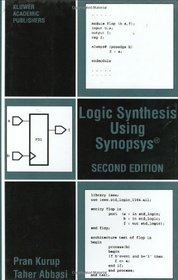Search -
Logic Synthesis Using Synopsis
Logic Synthesis Using Synopsis
Author:
Logic Synthesis Using Synopsys®, Second Edition is for anyone who hates reading manuals but would still like to learn logic synthesis as practised in the real world. Synopsys Design Compiler, the leading synthesis tool in the EDA marketplace, is the primary focus of the book. The contents of this book are specially organized to assist ... more »
Author:
Logic Synthesis Using Synopsys®, Second Edition is for anyone who hates reading manuals but would still like to learn logic synthesis as practised in the real world. Synopsys Design Compiler, the leading synthesis tool in the EDA marketplace, is the primary focus of the book. The contents of this book are specially organized to assist ... more »
ISBN-13: 9780792397861
ISBN-10: 079239786X
Publication Date: 1/15/1997
Pages: 322
Rating: ?
ISBN-10: 079239786X
Publication Date: 1/15/1997
Pages: 322
Rating: ?
0 stars, based on 0 rating
Genres:
- Computers & Technology >> Computer Science >> Circuitry >> Circuit Design
- Science & Math >> General
- Electrical & Electronics >> Digital Design




